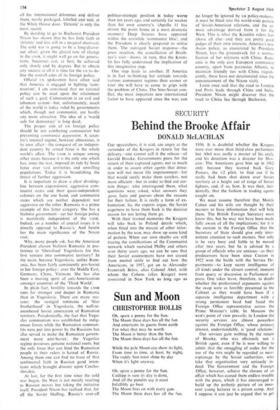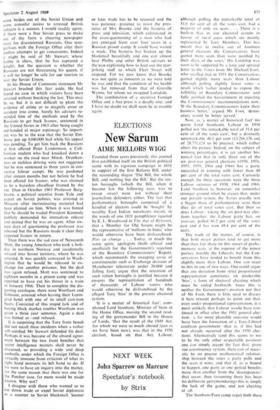SECURITY
Behind the Brooke Affair
DONALD McLACHLAN
Our spycatchers, it is said, are angry at the surrender of the Krogers in return for the delivery—one cannot call it the release—of Gerald Brooke. Governments press for the return of their captured agents, not so much in order to assure other agents that detec- tion will not mean life imprisonment—for that would surely make them careless, not more efficient—but in order to find out cer- tain things: who interrogated them, what questions were asked, what answers they gave, facts and guesses about the reasons for their failure. It is really a form of ex- humation. So, the experts argue, the Soviet eagerness to have them back is the decisive reason for not letting them go.
With their trained memories the Krogers will take back to Poland details which, when fitted into the mosaic of other infor- mation by the KGB, may show up some kind of pattern. When our own sleuths are still tracing the ramifications of the Communist network which recruited Philby and others over thirty years ago, we can be sure that their Soviet counterparts have not ceased from mental strife to find out how the Americans, in 1957, got on to Alexander Ivanovich Belov, alias Colonel Abel, with whom the Cohens (alias Kroger) were associated in New York as long ago as
1950. It is doubtful whether the Krogers were ever more than third-class performers but Abel was really a master of his craft, and his detection was a disaster for Mos- cow. The Americans gave him up in 1962 only because they wanted back Gary Powers, the u2 pilot, to find out if he really had been shot down over Soviet territory at a height out of range of Soviet fighters, and, if so, how. It was then, inci- dentally, that the fashion in trading agents caught on.
We must assume therefore that Morris Cohen and his wife are thought by their masters to have information that will help them. The British Foreign Secretary must know this, but he may not have been made fully aware of all the implications; for it is the custom in the Foreign Office that the Secretary of State should give only inter- mittent attention to such matters. Not only is he very busy and liable to be moved after two years, but he is advised by a group of officials who are anxious—as their predecessors have been since Curzon in 1922 won the battle with the Service De- partments—to keep secret intelligence of all kinds under the closest control, immune from query or discussion in Parliament or press. One takes leave, therefore, to doubt whether the professional arguments against the swop were as forcibly presented to the Cabinet as they would have been if a separate intelligence department with a strong permanent head had faced the Foreign Office representative across the Prime Minister's table. In Moscow the KGB'S point of view prevails; in London the security services are almost powerless against the Foreign Office, whose primary interest, understandably, is 'good relations.'
Our services gain nothing by the return of Brooke, who was obviously not a British agent, even if he is now willing to admit that the smuggling of codes for the use of the wrs might be regarded as near- espionage by the Soviet authorities, who take that organisation very seriously in- deed. The Government and the Foreign Office, however, achieve the closure of an affair which has caused them endless trouble with the press, which it has encouraged to build up the pathetic picture of an inno- cent young lecturer in a prison camp. And I suppose it can just be argued that to get
some brides out of the Soviet Union and some consular access to arrested British subjects is a success. I would readily agree, if there were a free Soviet press to make out of the facts a cheering newspaper story for discontented Russians. One sym- pathises with the Foreign Office after their endless attempts to get concessions. Indeed it might be said of Mr Stewart, whose hobby is chess, that he has captured a knight; but the question is whether the Russians are not threatening his queen, if it will no longer be safe for our tourists to visit the Soviet Union.
In his House of Commons statement Mr Stewart brushed this fear aside. He had found no case in which visitors have been arrested without breaking the law. This may be so, but it is not difficult to plant the evidence of crime or to magnify error or accident into crime. Surely his advisers re- minded him of the methods used by the
Russians to get back Ivanov, sentenced in the United States in 1963 after being caught
red-handed at major espionage. So import-
ant was he to the KGB that the Soviet Em- bassy put up $100,000 bail while his appeal
was pending. To get him back the Russians at first offered Peter Landerman, a Cali- fornian student who had knocked down a worker on the road near Minsk. Drunken- ness or reckless driving were not suggested but he was sentenced to three years in cor- rective labour camps. He was pardoned after sixteen months but not before he had been offered for Ivanov, who was claimed
to be a harmless chauffeur framed by the
rat. Then in October 1963 Professor Barg- hoorn, a political scientist from Yale and expert on Soviet politics, was arrested in Moscow after incriminating material had been planted on him. When it was hinted that he should be traded President Kennedy publicly demanded his immediate release and denied that he was an agent. After six- teen days of questioning the professor was released but the Russians made it clear they expected Ivanov in return.
Then there was the sad case of Newcomb Mott, the young American who took a holi- day in northern Norway and accidentally strayed into Soviet territory, where he was arrested. It was quickly conveyed to Wash- ington that he would be released in ex- change for another prisoner, but the deal was again refused. Mott was sentenced to eighteen months in a prison camp and was reported to have cut his throat in a train in January 1966. Then to complete the dis- gusting catalogue, there were Wortham and Gilmour, arrested when leaving their Lenin- grad hotel with one of its small cast-iron
bears. Convicted of this stupid lark and of buying black market roubles Wortham was given a three year sentence. Again a deal was hinted at—and refused.
It is surprising that the Tory front bench did not recall these incidents when a rather
self-satisfied Mr Stewart defended his deal.
Perhaps it was because of the absurd agree- ment between the two front benches that secret intelligence matters shall never be discussed, so providing a wide and deep umbrella under which the Foreign Office is virtually immune from criticism of what its
right hand instructs its left hand to do. If we were to have an inquiry into the matter, for the same reason that there was one for the Pincher case, far more would be made known. Why not?
I disagree with those who wanted us to cut down trade or expel Soviet diplomats as a counter to Soviet blackmail. Sooner or later trade has to be resumed and the was patience—patience to resist the pres- sures of Mrs Brooke and the hysteria of press and television, which culminated in the cross-questioning of a man who had just emerged from over four years in a Russian prison camp. It could have waited a week. The hysteria has backed up the blackmail beautifully and one can almost hear Philby and other British advisers to the KGB explaining how to feed out the tear- jerking stuff to which Fleet Street will respond. For we now know that Brooke was not quite as innocent as we were told he was and that the condition of his health was far removed from that of Greville Wynne, for whom we swapped Lonsdale.
The combination of a secretive Foreign Office and a free press is a deadly one; and I have no doubt we shall soon be in trouble again.



































 Previous page
Previous page